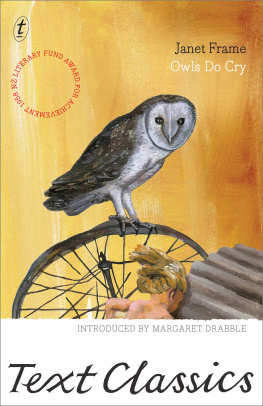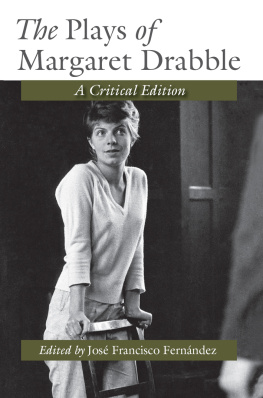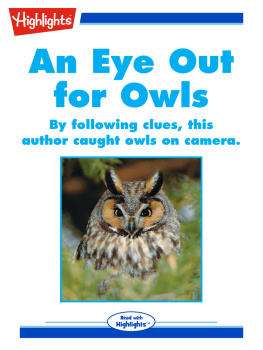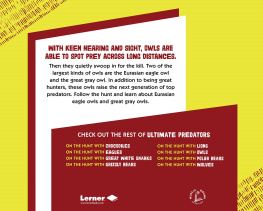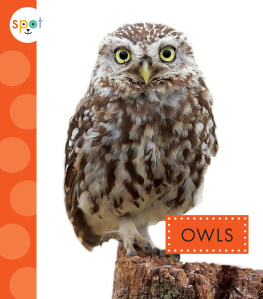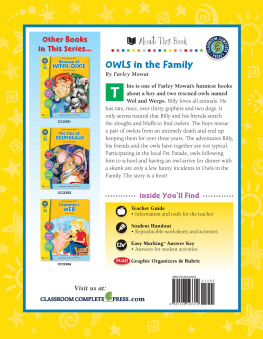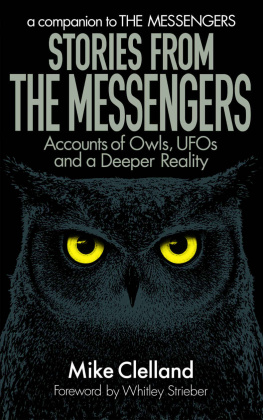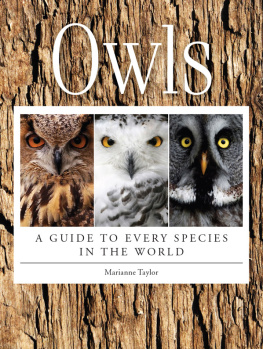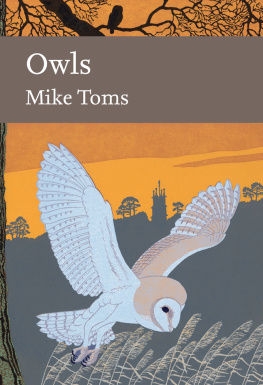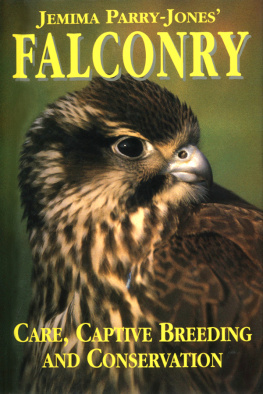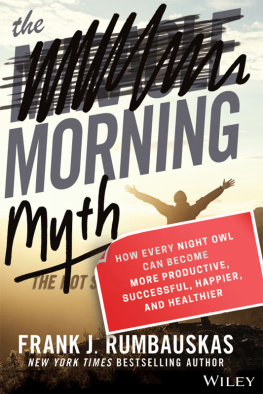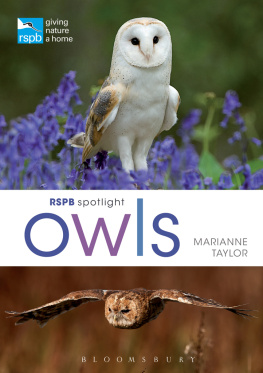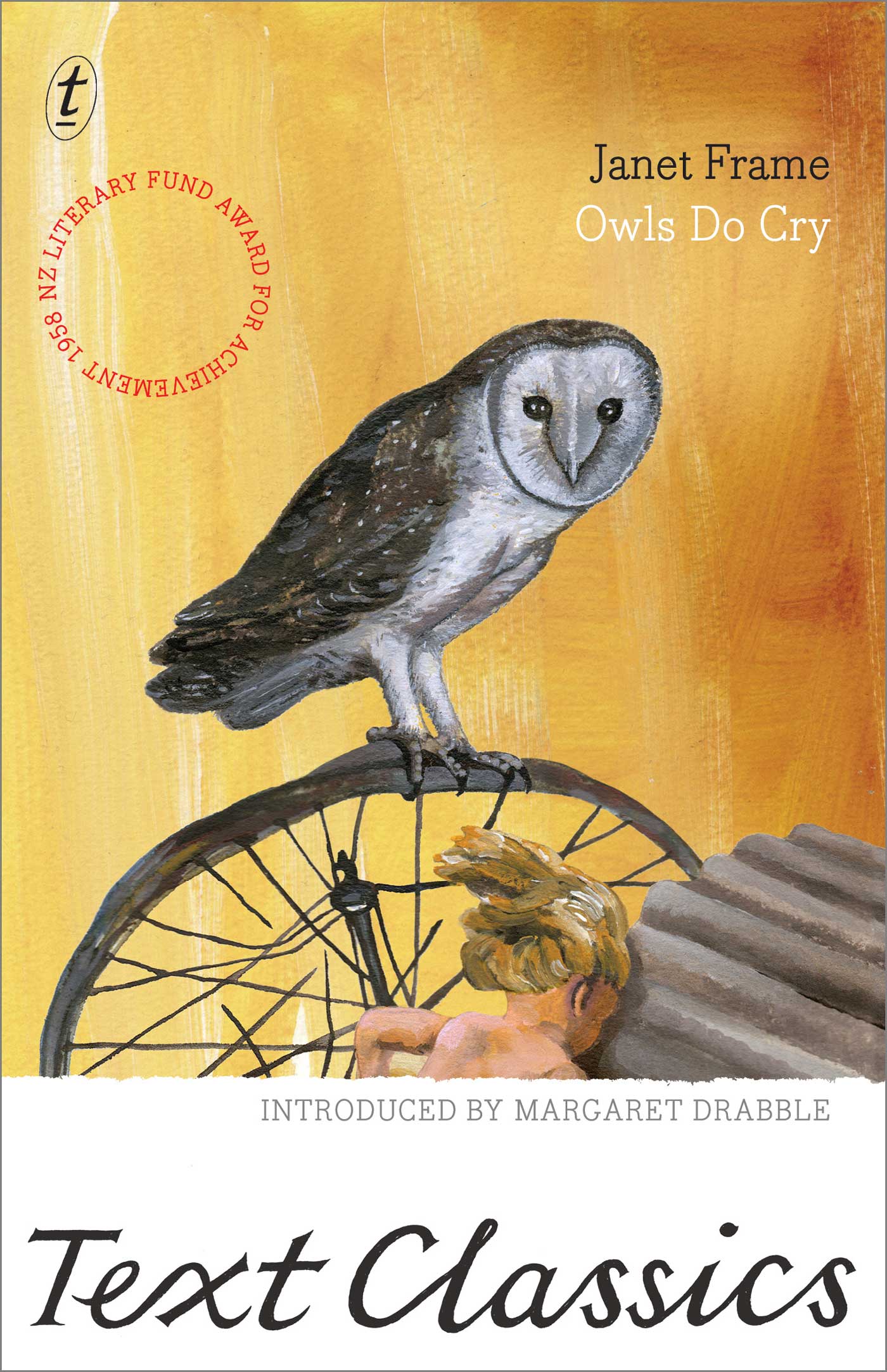

JANET FRAME was born in Dunedin in 1924. She reluctantly qualified as a teacher but secretly wanted to be a poet. Her first story was accepted for publication in 1945, and later that year she walked out of the classroom. Desperate when the authorities demanded she return to work out her bond, she attempted suicide and was misdiagnosed with schizophrenia. Frame spent the next ten years alternating between hospital stays and menial work, and more writing. She wrote her first book, The Lagoon and Other Stories, in 1946 while working as a live-in maid and studying part-time at university. When the collection was published in 1952 and won a prestigious literary prize, Frames doctors cancelled a lobotomy they had planned for her.
Owls Do Cry, Janet Frames first novel, was published in 1957. Shortly before its publication, she left New Zealand for what would be seven years and spent most of that time in England, where her earlier diagnosis was officially overturned and her writing gained international acclaim. Frame published another ten novels, three more short-story collections, a poetry volume and a three-volume autobiography during her lifetime. Another two novels, a short-story collection and a book of poems have been published since her death. Frames works have been published in twenty-five languages, and her bestselling autobiography was made into the film An Angel at My Table.
Janet Frame received numerous awards and honours, including a CBE and the Commonwealth Writers Prize. In 1990, she became a Member of the Order of New Zealand.
Janet Frame died in 2004.
DAME MARGARET DRABBLE was born in Sheffield in 1939. She is the author of eighteen highly acclaimed novels including A Summer Bird-Cage, The Millstone, The Sea Lady and most recently The Pure Gold Baby. She has also written biographies and screenplays, and was the editor of the Oxford Companion to English Literature. She was appointed CBE in 1980 and made DBE in 2008.
ALSO BY JANET FRAME
The Lagoon and Other Stories
Faces in the Water
The Edge of the Alphabet
Scented Gardens for the Blind
Snowman Snowman:
Fables and Fantasies
The Reservoir: Stories and Sketches
The Adaptable Man
A State of Siege
The Reservoir and Other Stories
The Pocket Mirror
The Rainbirds (published in the USA as Yellow Flowers in the Antipodean Room)
Mona Minim and the Smell of the Sun
Intensive Care
Daughter Buffalo
Living in the Maniototo
To the Is-Land
You Are Now Entering the Human Heart
An Angel at My Table
The Envoy from Mirror City
The Carpathians
The Goose Bath
Towards Another Summer
Storms Will Tell: Selected Poems
Prizes: Selected Short Stories (published in UK and Australia as The Daylight & the Dust)
Gorse is Not People (published in Australia and the USA as Between my Father and the King: New and Uncollected Stories)
Janet Frame in Her Own Words
In the Memorial Room
The Mijo Tree

textclassics.com.au
textpublishing.com.au
The Text Publishing Company
Swann House
22 William Street
Melbourne Victoria 3000
Australia
Copyright Janet Frame 1957
Introduction copyright Margaret Drabble 2014
The moral rights of the authors have been asserted.
All rights reserved. Without limiting the rights under copyright above, no part of this publication shall be reproduced, stored in or introduced into a retrieval system, or transmitted in any form or by any means (electronic, mechanical, photocopying, recording or otherwise), without the prior permission of both the copyright owner and the publisher of this book.
First published by Pegasus Press, Christchurch, 1957
This edition published by the Text Publishing Company, 2014
Cover design and illustration by W. H. Chong
Page design by Text
Typeset by Midland Typesetting
Printed in Australia by Griffin Press, an Accredited ISO AS/NZS 14001:2004
Environmental Management System printer
Primary print ISBN: 9781922147899
Ebook ISBN: 9781922148896
Author: Frame, Janet, 19242004, author.
Title: Owls do cry / by Janet Frame ; introduced by Margaret Drabble.
Series: Text classics.
Other Authors/Contributors: Drabble, Margaret, 1939 .
Dewey Number: NZ823.2
CONTENTS
by Margaret Drabble
A Cry of Joy and Pain
by Margaret Drabble
JANET Frames first full-length work of fiction, Owls Do Cry, is an exhilarating and dazzling prelude to her long and successful career. She was to write in several modes, publishing poems, short stories, fables, and volumes of autobiography, as well as other novels of varied degrees of formal complexity, but Owls Do Cry remains unique in her oeuvre. It has the freshness and fierceness of a mingled cry of joy and pain. Its evocation of childhood recalls Blakes Songs of Innocence and of Experience, as well as the otherworldly Shakespearean lyric of her title and epigraph, but her handling of her dark material is wholly original. Although the story of the Withers family is sombre, indeed tragic, what remains in the readers mind is the glory and intensity of the language, the heightened imagery, the brightness of an early world. She transforms the real (and at times uncomfortably identifiable) New Zealand provincial seaside town of Oamaru into a mythical and magical Waimaru, where places, events and characters are seen with the sharp remembering eye of redeeming love. This novel, which boldly confronts illness, physical and mental disability, ageing, and violent and sudden death, has a buoyancy of creativity and brightness. Some of its characters encounter defeat, but it is a song of survival.
Owls Do Cry was first published, to much acclaim, in 1957 by Pegasus Press in New Zealand, and gained Frame an international reputation when it appeared in 1960 in the US and 1961 in the UK. Some contemporary critics at home saw this account of the life of the town and of the Withers familythe parents Bob and Amy, and their children Francie, Toby, Daphne, and Chicksas a satire on the monochrome, monocultural, impoverished but materialistic society of post-war New Zealand, struggling slowly towards affluence. And it is true that Frame does make fun of the habits and opinions of the townsfolk, while deploying descriptions of material objects to singular effect, particularly in later passages about Chicks married life. In earlier sections, we learn much of family and neighbourhood folklore and dreamsthe visits of the tooth fairy with a promise of sixpence, the small silver tin of wedding cake to be put under the pillow, the adolescent longing to train to be an opera singer, the bribe of a new bicycle to ride in colours, red and gold and black, the false hopes placed in beauty aids (Wisteria Peach Bloom, Gloria Haven)but the overall impression is not of mockery but of wonder, a childlike wonder at the often incomprehensible oddities of the world. Frame remembers exactly how schoolchildren think, how they misunderstand and understand and make free associations (the nurse shark is a wonderful flight of fancy), but not all her prose is poetic: an unexpected everyday throwaway phrase such as He was to have his tonsils out, he said, and everyone felt envious takes one back, wholly convincingly, to a schoolboy mindset. She surprises, and she rings true. There is comedy as well as pathos.
Next page
